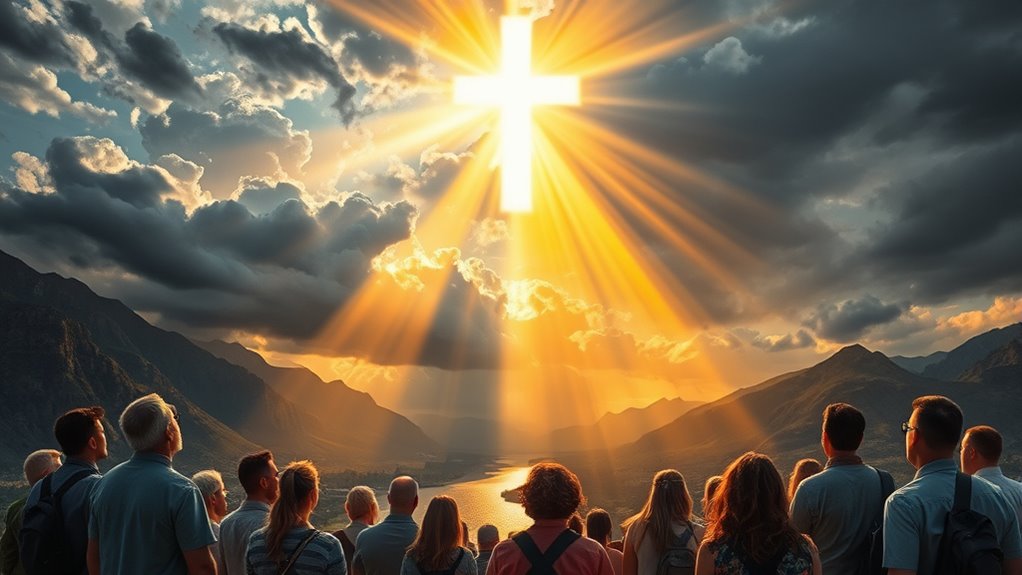The Rapture is a key aspect of Christian end-times beliefs, with various views like pre-, mid-, and post-tribulation, each supported by different scriptures such as 1 Thessalonians 4:16-17 and Revelation 3:10. Dispensationalists emphasize a literal, imminent event, while amillennialists see it as symbolic. Understanding these perspectives and biblical passages can help clarify the complex ideas behind the Rapture—if you keep exploring, you’ll gain a deeper insight into this fascinating topic.
Key Takeaways
- The Rapture refers to the belief that Christians will be suddenly taken up to meet Christ before, during, or after tribulation, based on biblical passages like 1 Thessalonians 4:16-17.
- Major views include Pre-Tribulation, Mid-Tribulation, and Post-Tribulation, each citing different scriptures to support their timing of the event.
- Dispensationalism emphasizes a literal interpretation and a pre-tribulation rapture, while Amillennialism views end-times as symbolic and ongoing spiritually.
- Key scriptures such as Revelation 3:10 and John 14:3 highlight Christ’s return and believer’s gathering, often interpreted metaphorically or literally.
- Contemporary perspectives vary, influencing Christian life, eschatological expectations, and interpretations of prophecy and hope.
Historical Origins of the Rapture Concept

The concept of the Rapture has roots that trace back to early Christian writings, but it wasn’t until the 19th century that it gained widespread popularity. During this time, eschatology debates intensified, leading to diverse interpretations among theologians. These debates fueled theological divergence, with some viewing the Rapture as a literal event and others seeing it metaphorical. The rise of premillennialism and dispensationalism helped cement the idea in popular thought, especially among American evangelicals. As different groups emphasized various scriptures, the notion of believers being caught up to meet Christ became a focal point of theological discussion. This historical development reflects how the Rapture’s origins are intertwined with evolving eschatological views and ongoing theological divergence.
Pre-Tribulation Rapture View

The Pre-Tribulation Rapture view is based on specific biblical passages that suggest believers will be taken up before the tribulation begins. Understanding these scriptures helps clarify what this view means for how you live your faith today. It also highlights the implications for your hope and preparedness amidst future challenges.
Biblical Basis for Pre-Trib
Proponents of the Pre-Tribulation Rapture often cite specific biblical passages to support their view that believers will be taken up before the tribulation period begins. They interpret mystical symbolism in scriptures like Revelation 3:10, where the church is spared from “the hour of trial,” as evidence that believers will be removed beforehand. Cultural influences also shape their understanding, emphasizing God’s mercy and the importance of divine protection. These biblical references are seen as clear indicators that the Rapture occurs prior to the tribulation, aligning with the idea that Christians are spared from God’s wrath. By examining these scriptures, supporters argue that the Pre-Trib view is rooted in a literal, biblical understanding rather than allegory or tradition.
Implications for Believers
Believing in a Pre-Tribulation Rapture profoundly influences how you might approach your faith and daily life, as it offers the reassurance that you will be spared from the most severe judgments to come. This belief encourages you to focus on spiritual preparedness, staying vigilant and committed to living according to biblical principles. It also promotes church unity, inspiring believers to bond together in prayer, fellowship, and mutual support, knowing that they share this hope of escape. With the promise of being raptured before tribulation, you’re motivated to strengthen your relationship with Christ, remaining steadfast amid worldly challenges. Ultimately, this view shapes your outlook, fostering confidence and encouraging active faithfulness in anticipation of Christ’s return.
Mid-Tribulation and Post-Tribulation Perspectives

Now, you’ll explore how the timing of the rapture differs between mid-trib and post-trib views. You’ll examine the scriptural evidence that supporters cite for each perspective. Understanding these points helps clarify the debates surrounding when believers will be taken up.
Timing of Rapture
Have you ever wondered when the Rapture will occur in relation to the Tribulation? The Mid-Tribulation and Post-Tribulation perspectives differ on this timing. Mid-Trib believers think the Rapture happens halfway through the Tribulation, while Post-Trib adherents believe it occurs after the Tribulation ends. These views are rooted in eschatology debates about prophetic symbolism and biblical interpretation. Some argue that understanding the timing clarifies God’s plan, while others see it as symbolic rather than literal. The table below highlights key differences:
| Perspective | Timing of Rapture |
|---|---|
| Mid-Tribulation | At the 3.5-year mark of Tribulation |
| Post-Tribulation | After the Tribulation concludes |
| Eschatology debates | Focus on prophetic symbolism |
| Interpretations | Vary based on biblical and theological views |
Scriptural Evidence Analysis
Examining the scriptural evidence for the timing of the Rapture reveals distinct interpretations between Mid-Tribulation and Post-Tribulation perspectives. Supporters point to prophetic symbolism in passages like Revelation 11:11-12 and 1 Thessalonians 4:16-17, emphasizing God’s deliverance during different prophetic moments. Mid-Trib advocates see these scriptures as indicating believers are raptured midway through the tribulation period, while Post-Trib proponents interpret them as pointing to a post-tribulation rescue. These differing views fuel theological debates, as each side interprets key scriptures through varying lenses of prophetic symbolism. Understanding these nuances helps clarify how scripture is used to support each perspective, highlighting the complexity and depth of the ongoing discussion about the Rapture’s timing.
The Role of Key Biblical Passages

Key biblical passages serve as the foundation for understanding the concept of the Rapture, shaping how you interpret its timing and significance. These scriptures, rich in eschatological symbolism, guide your biblical prophecy interpretation. For example, 1 Thessalonians 4:16-17 and 1 Corinthians 15:52 highlight the moment of Christ’s return and believers’ gathering. Recognizing these passages helps clarify differing views and deepen your understanding of end-times events. To illustrate, consider this table:
| Passage | Eschatological Symbolism | Interpretation |
|---|---|---|
| 1 Thessalonians 4:16-17 | The trumpet call | The immediate gathering of believers |
| John 14:3 | Coming in the clouds | Christ’s return with glory |
| Revelation 3:10 | Rapture as deliverance | Preservation before tribulation |
These key passages shape your biblical prophecy interpretation and understanding of eschatological symbolism.
Differences Between Dispensationalism and Amillennialism

Understanding the biblical passages that shape our view of the Rapture helps reveal how different interpretive frameworks approach end-times events. Dispensationalism and Amillennialism represent two main perspectives in eschatology debates, with distinct theological differences. Dispensationalists believe in a literal interpretation of prophecy, emphasizing a pre-tribulation Rapture where believers are taken before a literal seven-year tribulation. In contrast, Amillennialists interpret scripture symbolically, seeing the “millennium” as a present spiritual reign of Christ, not a future physical event. These differences influence their understanding of the Rapture, timing, and the nature of Christ’s return. Recognizing these theological differences helps clarify why each framework sees end-times events through a unique interpretive lens.
Symbolic and Literal Interpretations of Scripture

Different approaches to interpreting scripture often hinge on whether you view biblical texts as symbolic or literal. You might see certain passages as literal truth, or as metaphorical language that conveys deeper meaning. Understanding the balance between literal vs. symbolic interpretation can profoundly impact your view of prophecy and the rapture. When you interpret scripture literally, you accept the straightforward meaning of words. In contrast, symbolic interpretation invites you to see metaphors and images that point to spiritual truths beyond the surface. This distinction can evoke powerful emotions and shape your faith.
Understanding scripture as literal or symbolic shapes your faith and reveals deeper spiritual truths beyond the surface.
- Feel the awe when you realize scripture’s depth through metaphorical language
- Experience conviction as you grapple with literal vs. symbolic truths
- Find hope in the layered meanings that inspire your spiritual journey
Contemporary Christian Views on the Rapture

Contemporary Christian communities hold diverse perspectives on the rapture, shaping how you anticipate this pivotal event. Prophecy debates fuel differing views, with some believing in a pre-tribulation rapture, others favoring post-tribulation, and some seeing it as symbolic. Theological diversity influences these interpretations, reflecting varied understandings of Scripture and end-times prophecy. These debates often center around the timing and nature of the rapture, impacting how believers live and prepare. Recognizing this spectrum helps you appreciate the richness of Christian thought today. Here’s a quick overview of common views:
| View | Timing of Rapture | Key Beliefs |
|---|---|---|
| Pre-Tribulation | Before tribulation | Escape suffering, imminent return |
| Post-Tribulation | After tribulation | Endure hardships, Christ’s return |
| Mid-Tribulation | Midway through tribulation | Balance of suffering and hope |
Impact of Rapture Theology on Christian Life and End-Time Expectations

Theology about the rapture considerably shapes how you live your daily life and view the end times. Your beliefs influence your sense of urgency, preparedness, and hope. Eschatology debates and theological implications often determine whether you focus on evangelism or personal reflection. These views can inspire a sense of purpose or cause anxiety about the future.
- Feel a renewed sense of urgency to share your faith, knowing the end could come at any moment.
- Embrace a hopeful outlook, trusting in God’s plan amid complex theological debates.
- Experience a deeper desire for spiritual readiness, motivated by the belief that the rapture could occur unexpectedly.
Your understanding of the rapture impacts your attitude toward life, death, and eternity, shaping how you navigate the challenges and promises of faith.
Frequently Asked Questions
How Do Different Christian Denominations Interpret the Rapture?
You’ll find that different Christian denominations have varying eschatology differences, influencing their doctrinal interpretations of the Rapture. Some, like Evangelicals and Fundamentalists, see it as a future event occurring before tribulation. Others, such as Catholic and mainline Protestants, interpret it more symbolically or as part of Christ’s second coming. These differing views shape how each denomination teaches and understands the end times, reflecting diverse theological perspectives across Christianity.
What Are the Main Criticisms of Rapture Theology?
You might question the main criticisms of Rapture theology, especially in pre-tribulation debates. Critics argue that biblical literalism can lead to misinterpretations, as the scripture’s symbolism is often overlooked. They also contend that the idea of a secret Rapture isn’t clearly supported in the Bible and promotes an escapist mindset. Skeptics believe it distracts believers from living faithfully and addressing real-world issues.
Is There Archaeological Evidence Supporting the Concept of the Rapture?
Searching for supportive signs, you’ll find scant archaeological artifacts or biblical excavations directly supporting the rapture concept. Skeptics stress that no tangible, time-tested treasures confirm this theological idea, emphasizing that biblical interpretations often rely more on spiritual symbolism than solid archaeological evidence. While excavations reveal fascinating historical facts, they don’t specifically validate the rapture’s biblical or theological claims, leaving believers to trust faith over factual findings.
How Does Rapture Theology Influence Christian Political Views?
You might notice that rapture theology influences your political views by shaping your stance on current events and moral issues. In eschatology debates, this theological influence encourages you to prioritize issues like religious freedom and moral values, expecting divine intervention. It can also motivate you to support policies aligned with biblical prophecy, reinforcing a sense of urgency for societal change based on your beliefs about the end times and God’s plan.
What Are the Psychological Effects of Believing in the Rapture?
Thinking about the rapture can gently bolster your spiritual hope, offering comfort amidst life’s uncertainties. However, it might also lead to faith anxiety if you worry about missing the moment or feeling unprepared. This belief can deepen your sense of purpose and trust in divine plans, yet sometimes, it makes you cling more tightly to faith. Ultimately, it shapes how you emotionally navigate life’s challenges, blending reassurance with occasional concern.
Conclusion
Understanding the rapture can seem complex, but exploring its biblical roots reveals its significance. Don’t let differing interpretations discourage you; instead, see it as an invitation to deepen your faith and hope. Whether you view it literally or symbolically, embracing the core message of preparedness and trust in God’s plan can inspire you daily. After all, focusing on your relationship with Christ offers reassurance, no matter which perspective resonates most with you.










